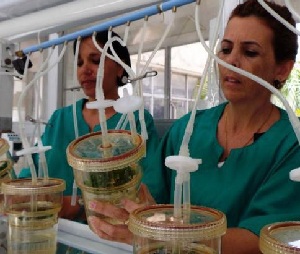 Cuba’s battle against COVID-19, and the positive results achieved, have allowed us to understand the value of science in the solution of the country’s main problems, and that the role universities must play, an experience that can and must be extended to other arenas, among them food production, the nation’s number one priority at this time.
Cuba’s battle against COVID-19, and the positive results achieved, have allowed us to understand the value of science in the solution of the country’s main problems, and that the role universities must play, an experience that can and must be extended to other arenas, among them food production, the nation’s number one priority at this time.
President Miguel Díaz-Canel Bermúdez announced in June that a first meeting will be held with the entire science and innovation system involved in this issue, which will allow for a review of how much progress has been made on this front and, above all, how much remains to be done to overcome the obstacles that continue to limit the development of the productive forces in Cuba’s fields.
Marta Abreu Central University of Las Villas (UCLV), provides an example of what can be achieved when articulated policies are implemented to link agricultural actors with researchers at institutions of higher learning.
Fidel’s foresight led to the creation, 28 years ago, of the Institute of Plant Biotechnology (IBP), a center specialized in reproduction techniques using biotechnological methods, to produce seeds of high genetic and sanitary quality, in addition to the development of technologies and products with increased value added, to be marketed in Cuba and abroad.
IBP director Dr. Osvaldo Fernández explained the institution’s results, citing the example of potato microtuber production in temporary immersion systems, sent directly to the field, which has allowed for a shortening of the certified seed production cycle, to gradually replace imports.
With respect to other crops such as bananas, Fernández Martínez explains that IBP researchers have developed propagation systems that distinguish Cuba at the international level, such as somatic embryogenesis, which won the country’s Technological Innovation Award in 2017. This technology is currently being transferred, in stages, to biofactories in the provinces of Pinar del Río, Mayabeque, Cienfuegos, Villa Clara, Ciego de Ávila, Camagüey, Granma and Guantánamo, among others of this type.
Among a variety of projects, the center has as a strategy the creation of fruit tree modules to deliver to neighborhoods, communities and family gardens, which include mamey, mango, lemon and avocado seedlings, among others, reported Dr. Osvaldo Fernandez, adding that work has also been done on the cultivation of strawberries and ornamental plants, the latter a line that has generated significant economic income for the Institute.
Bioactives for agriculture
Dr. Zenaida Rodriguez Negrin is responsible for the management of the Center for Chemical Bioactives (CBQ) at UCLV. Among the center’s outstanding contributions is Vitrofural, an essential chemical sterilizer for the disinfection of culture media used in biofactories in Cuba and around the world.
“Today we guarantee the full amount of Vitrofural needed for the operation of all these entities in the country, taking into consideration that with every six grams of the solution we deliver to the Ministry of Agriculture, up to 50 liters of culture media can be sterilized,” the specialist explains.
This product is also successfully used in fish farming, particularly to reduce bacteria in the transfer of larvae, which has been shown to reduce mortality by 40 percent, Dr. Rodríguez reported.
Thanks to the quality of the product, and the commitment of the cbq workforce, today Vitrofural is exported to six countries in Latin America, with Chile as the main destination, and orders have been received from Canada and Spain, she noted.
Another achievement of the institution is Agro g, a bioproduct capable of enhancing nutrients that support the development of plants, in addition to facilitating increased yields in a variety of crops, including rice, beans, corn and seedlings grown in greenhouses.
This accomplishment is the result of a joint effort by the cbq and the ibp, currently the more than 24,000 liters produced monthly are utilized by agricultural production cooperatives and several enterprises, including the Valle del Yabú company in Santa Clara, while its potential benefits in cultivating sugar cane are also being studied, Dr. Rodríguez noted.
Pig farmers in the province can testify to the UCLV Agricultural Sciences department’s relations with producers, given the support these scientists have provided in developing technologies to produce alternative feed components, to raise animals on cassava, sweet potato and high-protein plants.
On the subject, the department’s young dean, Raciel Lima Orozco, explained that there is not a single line of research underway that is not directed toward resolving problems in agriculture, mentioning low yields, pest and disease management, pasture and forage production, soil erosion and import substitution, as some of the most important research topics being pursued.
In addition, several training courses for personnel working in agriculture have been added, with the university’s main specialists visiting farms, enterprise facilities and production centers, while students in different agricultural sciences fields complete practicums focused on the solution of problems.
These are just some of the economically significant projects currently underway at the UCLV that reveal existing untapped potential – Efforts that must be expanded across the country, to increase food production on the basis of knowledge, science, technology and innovation.
(Source: Granma)